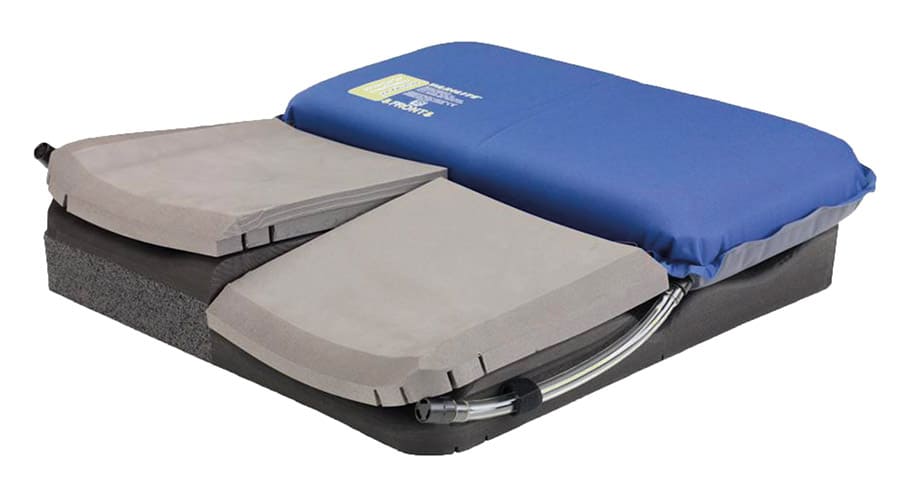Trade Thoughts: How can mobility retailers maximise sales for pressure care products?
This month, THIIS asks pressure care industry leaders, how do they think mobility retailers can maximise sales for pressure care products.
All thoughts were submitted to THIIS in March 2022.
Graham Collyer, Executive Chairman, Sumed International (UK)
“Choice of products designed for the prevention of pressure damage should always be guided by an appropriately qualified healthcare professional such as a tissue viability nurse, a district nurse or an occupational therapist.
“It is broadly accepted that 95 per cent of pressure ulcers are preventable. Information is made available on the NHS website and Trusts also provide information locally. Members of the public are guided to seek advice from their care team.
“In the age of “the informed patient”, mobility retailers have a key role in signposting customers to information which will help them in ensuring that they are using appropriate products.
“Often pressure area care products available through the NHS or Social Care are limited according to what is on a local formulary; members of the person’s care team should be able to advise alternatives which could be bought themselves or by a family member.
“Some mobility retailers employ appropriately qualified healthcare professionals who may be able to help in advising alternative products to those available locally. There is a key role for mobility retailers to make available appropriate products such as mattresses – dynamic or high-quality foam, cushions – designed to be used by clients according to risk category, and heel protectors.
“These could be stocked or more likely a retailer will order products from a manufacturer on a next day delivery. Product manufacturers such as Sumed, make available charts showing which cushions, mattresses and heel products are available for clients at different risk levels. Pressure mapping sessions can be arranged.
“The mobility retailer has key role in ensuring that their customers are aware of the early signs of pressure damage, steps they can take in avoiding pressure damage and when to seek advice from a healthcare professional.”
David Beavis, Sales Director, MediSmart Technologies
“There is sometimes confusion in our specialist retail healthcare market between what is known as “up-selling” and that of “cross-selling”. Up-selling encourages a customer to spend more by buying an upgraded or premium version.
“Cross-selling is about building additional products to the order. So in the example of “do you want fries with that?” it is not up-selling it is instead-cross-selling an additional item. How often have we experienced this ourselves when we purchase from an on-line retailer and they make suggestions at check-out such as: other customers also purchased this as well?
“Most retailers in our specialist healthcare market will know more than myself that two of the main challenges would be:
“Not always talking to the actual user of the equipment, but rather the family who have been tasked to source products that they may have never encountered before-this experience is all new to them.
“Having room in their showrooms to display full size mattresses and beds when discussing pressure care.
“Pressure care products are a great opportunity for retailers to enhance their sales, however none of this matters if not just the needs but the needs behind their needs are not established. These are based on circumstances and effects.”
Greg Whelan, Director of Product and Marketing, Wellell
“Pressure area care is often associated with care homes and hospitals, but pressure injuries resulting in pressure ulcers can be suffered in the home just as easily as in a care environment. So why do these happen and where does the Mobility Retailer fit into the process?
“Pressure injuries are basically as a result of extended periods of time in the same position, sometimes exaggerated by bony prominences of the body resting on insufficient support surfaces. These are notoriously difficult to manage once acquired and without the appropriate solution can lead to hospital admissions.
“So how does the Mobility Retailer fit into the process? Quite simply you can offer products that will reduce that risk to your client and whilst a client may not need the whole suite of products that are available initially, they may need to purchase additional dynamic products if or when their condition changes and you can be there to support them with those changing needs.
“With products such as the Domus 1, a bubble mattress you can offer cost effective and simple pressure area care on a rise recliner, a dynamic (air) cushion for a wheelchair if required e.g. Sedens 500 and if the client is susceptible to spending lengthy periods of time in bed then a pressure area care mattress can be offered such as the Domus Auto, with a simple “no-fuss” automatic function offering enhanced pressure care.
“These simple to use products can afford the client greater comfort and minimise the risk of developing a pressure ulcer instead offering a more care-free, heathier and happier life. As we say at Wellell UK Limited – Be Well, Live Well.”
Mitch Preedy, Sales Manager, Helping Hand Pressure Care
“Where I see opportunity in dealers for Pressure Care is giving it the attention it needs by introducing a specialist or a champion who can assist in identifying the users needs as they won’t be buying a pressure cushion just for comfort.
“It is far too easy for the customer to look at the price and just purchase a very basic foam cushion or even our enemy the ring cushion as it makes the process very simple when it shouldn’t be, somebody needing a pressure cushion could have a huge amount of issues that need to be considered not just if they have skin breakdown.
“A simple matrix supported by a few key questions or even the use of an Assessment Tool could quite easily identify which cushion the user should be directed to, then of course their comfort is key as well as meeting their need. I feel the customer would really appreciate that they have been in discussion with an expert which builds trust and confidence to use the supplier in future.
“I am sure this is a process most dealers use anyway and the information that Barend ter Haar has been sharing through THIIS on pressure cushions is extremely helpful for anybody in our industry to refer to especially people who are required to be knowledgeable about a wide range of products.”
Jason Brown, Commerical Manager, NRS Healthcare
“Visibility is important when it comes to pressure care products. Retailers should try to avoid having their product stuck away in a corner or on a poorly lit shelf. If retailers want to maximise sales they need to have their product front and centre. Work with suppliers who may well have point-of-sales materials to help, particularly if you, as a retailer, are actively promoting their range.
“Product knowledge is also important. Retailers need to know what they are selling inside out so that the products they recommend are fit for purpose. “Another tip is to try to become the local expert. Pressure care can be a complex area and it is important that the product being recommended is the right product for the client. Incorrect products can lead to major problems like pressure sores.
“Retailers can find out from the suppliers whether they are prepared to run courses on their products, allowing you to become the local expert. It is also a good idea to network with care homes, local authorities and the local health service in the area so you become the “go to” person for their pressure care needs, when they have to signpost for self funders.
“Product up-selling is recommended too. If you are selling a wheelchair for example, a fit for purpose cushion can be offered at point of purchase. This ties in to having the product front and centre in the shop.
“Where possible, retailers should follow up how the product is performing for the client with options available should their condition worsen. This links back to my earlier point, where retailers need to become the local expert and ‘go to’ person.”







